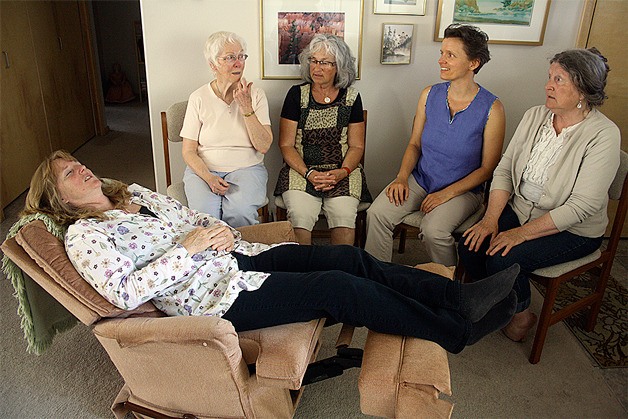For those preparing to pass life’s final threshold, a group of Whidbey women offer a musical gift of transcendence and healing.
The Threshold Singers do not consider themselves a choir, nor do they consider their work a performance.
The singers, of whom there are 15 in the Whidbey Island chapter, are all volunteers. Their work is deeply personal, and free of charge.
They most often sing at the bedsides of the dying, in homes and at care facilities, including Enso House and Careage of Whidbey. They also sing to caregivers and family members of those who are preparing to die, some of whom learn the songs and sing along.
“Music can be a transcendent experience,” said Anne Zontine, one of the members present at the June 18 Rest Easy at Healing Circles Langley, one of a handful of public presentations by the group.
“I think we are working with the idea of what death means in our lives and in our culture and helping people to have the death experience be something that is positive and gentle, looking at it in more of a transformative way,” said Zontine, adding that instead of a negative transition, the experience can be made more positive, for the dying as well as their loved ones.
The group is the Whidbey chapter of an international organization with locations ranging from London to California.
The National Threshold Choir Organization has approximately 500 songs in its database, some of which are folk songs, passed through the generations, such as a Nigerian song in honor of elders. Others were written specifically for the bedside.
The Threshold Singers are not associated with any religion, though they sing hymns or other religious melodies, as well as other favorites, upon request. One man requested “Take Me Out to the Ball Game,” the women recalled.
The cadence and tempo of the song also differs based upon the client’s preferences.
Christa Straub explained that, when a person is in the process of dying, the singers often hum rather than use words. At other times, clients request a more upbeat tempo.
Straub noted that, in the final days of a person’s life, much of the focus is upon medical needs. The music offers a respite from the chaos, for the clients as well as their caregivers.
Some of those who’ve been visited for some time begin to learn the songs themselves and sing along.
“It’s very sweet,” Straub said.
Music is particularly effective due to the fact that hearing is one of the last human faculties to be lost in the dying process, Effie Brown said.
Brown, who is experienced in hospice care, noted that the medical community is, slowly, beginning to recognize palliative care as a viable option.
“In the same way we’ve reclaimed the birthing process, in our home and in our families, that’s the same way we want to reclaim the dying process,” Brown said. “We’re passionate about the work.”
The group began when three women from North Whidbey, who had been gathering and performing in Anacortes, decided to start a local chapter approximately five years ago.
Today, the group is composed of women from all areas of the island, including Freeland, Coupeville and Oak Harbor, and is always welcoming of new members.
Zontine noted that many begin working with the group as they navigate their own grief.
“We find that when we sing with each other, it is a very nurturing and nourishing thing for us, as people that are participating,” Zontine said. “When we sing with others in a circle like this, we find that it is a very meditative time for people to go to another space with their consciousness.”
At a recent rehearsal at the home of Brown, the women instructed their newest member, Susan Hanson, to lie down in a recliner, eyes closed and shoes removed, to relax and experience the songs from a client’s perspective.
It is one of many ways in which the women ensure they are as familiar with the clients’ experience as possible.
Several of the singers have worked in healthcare, often in hospice.
During personal, bedside visits, the women typically sing in groups of two or three, always requiring that a caregiver be present.
The bedside visits are confidential, and are often made upon referral.
“My sense is that music is a universal language that goes directly to the heart of the person,” said Effie Brown.



